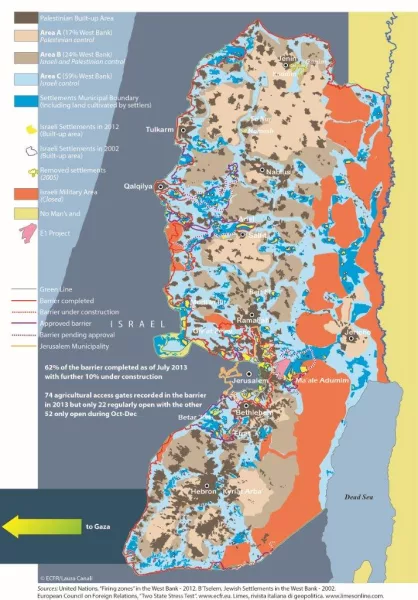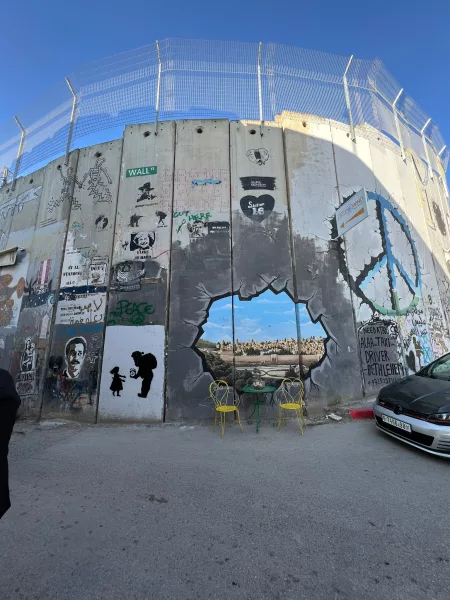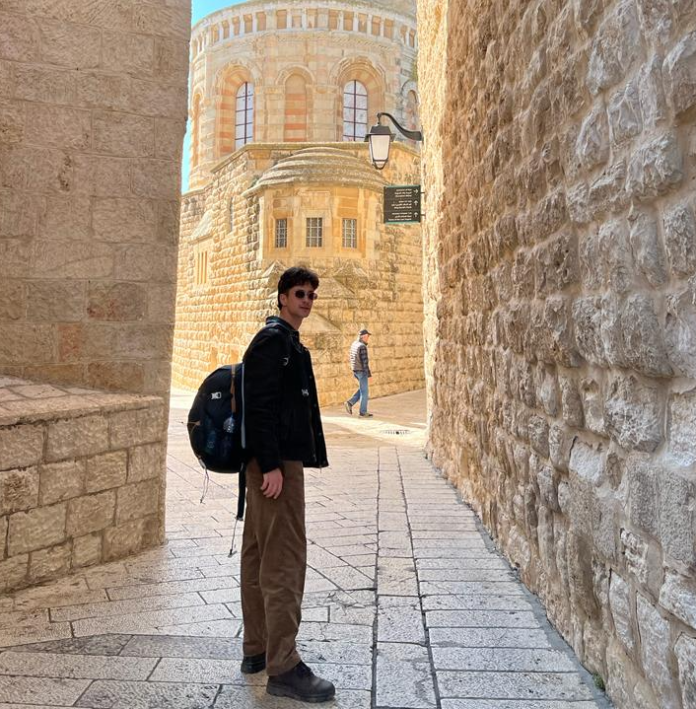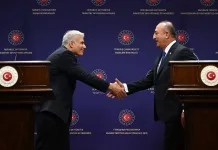While most students went home for winter break, some seeked to explore. Andrei Fanatan, a first year PPLE+DBA student from Romania, was one of them. But he is no ordinary traveler, and he did not choose a common touristic destination. In fact, exploring was not even in the plans. He had to travel from Romania to Madrid , and plane tickets were expensive. Andrei recounted, “I saw an option from Romania to Amman, Amman to Bologna, and Bologna to Madrid for €60.” Perfect! A 10-day trip to the Middle East… a solo adventure.
Andrei traveled alone through Palestine for 5 days, then met his friend Emilio in the south of Jordan for a more touristic experience. Here, he shares his endeavors through Palestine:
“I AM SAYING THIS AS A DISCLAIMER: I DON’T UNDERSTAND THE CONFLICT COMPLETELY, AND EVEN THOUGH I WAS THERE AND I TALKED TO MANY LOCALS, THE CONFLICT IS FAR MORE COMPLEX. HOWEVER, YOU CAN STILL SEE THAT THE WAY THE OCCUPATION IS BEING HANDLED AND THE WAY THESE PEOPLE ARE BEING TREATED IS MORALLY WRONG”
In general, the government has established multiple oppressive, systemic laws that Palestinians are subjected to. Amir Ohana, current speaker of the Knesset, discussed the Jewish-nation state bill, “It states that everyone has human rights, but national rights in Israel belong only to the Jewish people. That is the founding principle on which the state was established.”
When speaking about territories, it is a whole other story. Before landing in Amman, Andrei had no idea what to do or where to go, only carrying a positive mindset. “I opened the map and asked myself ‘where can I go?’ – I saw Palestine was so close,” Andrei recalled, “I made the decision to go to Palestine at 11PM on the day of my arrival. My bus was the following day at 7AM.”
Most Palestinian border restrictions do not apply to the majority of the tourists, but travelers must pass rigorous checkpoints and could be left with limitations. For example, passports receive a stamp when exiting Israel, which consequently denies travelers entry to nations such as Lebanon, Syria, Yemen, Iran, Libya, Kuwait, and Sudan.
Andrei noticed backpackers crossing the border were in similar situations to him. Regarding passport checks, documents, and crossing fees, he explained “nobody knew exactly what to do. It was up to you to figure it out by asking.” Fortunately, he met a young Japanese traveler, called Saki. Saki, just like Andrei, had no set plan, and wanted to hitchhike. They stuck together for the remainder of the trip.
Andrei laughed, “It takes a bit of crazy to do something like that, I am aware. I trusted that everything will be fine, and the Universe will take care of me. When you surrender yourself, let go of control and just trust – everything works out.”
Upon crossing the border, Andrei and his newly-found travel partner hitchhiked to Jericho – claimed to be the oldest city in the world. Arriving from point A to point B was no easy task, and they were often barricaded by some form of control. “I had my passport and visa checked around 15 times, I was also interrogated by armed men,” Andrei shared, “I knew the West Bank was heavily occupied by the Israeli military, but it was shocking to see it.”
Andrei was particularly surprised by a wall between the West Bank and the proper territories of Israel. In the early 2000s, Israel built the West Bank Barrier to physically establish territorial demarcation in accordance with the 1949 Armistice agreements. Nonetheless, the barrier violates the agreement. 85% of the current wall is built on the West Bank, and its perimeter has reduced the size of the territory by 10%.
The West Bank is governed under military law, and Palestinians are subjected to military courts. Whereas Israeli settlers are subjected to Israel’s civil law and can receive protections. Israel’s constitution establishes, “The right to exercise national self-determination … is unique to the Jewish people.” As long as the military occupation continues, Israel has the duty of protecting Palestinians living under the occupation yet some locals claim that authorities are ordered not to defend Palestinians, resulting in cases of Israeli settlers committing injustices against them, without consequences from the army.
All being said, on October 2022, the UN declared Israel’s occupation of Palestinian territory unlawful under international law, due to its permanence. In addition, the UN called attention to Israel’s de facto annexation plan by expropriation and exploitation of land and natural resources, and zoning policies that have contributed to diminishing space for Palestinians.
Seen on the map below, the West Bank is dotted with many Palestinian and Israeli settlements, each with different ownership and living regulations:

All Palestinian territories are separated and surrounded by Israeli settlements. Travelers must hold a permit, and comply with interrogations and checks. The Israeli government is indirectly forcing Palestinians out in a number of ways: increased checkpoints, raised prices, harassment from settlers, and soldiers turning a blind eye.
Andrei explained, “huge Israeli communities have settled in Palestinian territories; and there’s nothing Palestinians can do about it. They are simply refusing to move out; but many have deemed it terrorism.”
Andrei’s next stop was Jerusalem. He said, “We were 5 kilometers away and thought we could travel there directly. Our driver explained that in order to get to the old city of Jerusalem we had to cross the border wall by bus, because not all Palestinians were allowed inside.”
“The bus system in the West Bank is yet another representation of segregation. Israeli buses can move freely; while Palestinian buses only drive through Palestinian villages. They are also frequently checked and interrogated by police.”

“I realized there was something peculiar about Hebron, when our accommodation host insisted on escorting us to the house” Andrei details, “I wasn’t aware we were in the heart of the conflict.”
In Hebron, residents showed Andrei around. They encountered a huge fortress with Israeli flags. At this point, one of the locals accompanying them refused to go any further as he would get shot.
The final stop was Al-Arroub, a refugee camp managed by the UN. However, the area is under Israeli control and surrounded by the Israeli army. Andrei recalled, “in the rest of Palestine, people were happy, smiling, outgoing… the refugee camp was different, you feel the shift.”
Looking back at the end of his winter adventure, Andrei shared a key reflection from the journey, “back home in Europe, the environment is sterile, many people live in their heads – nobody talks to each other. In the countries I visited, interacting with people, and making conversation with strangers was normal and a given.”
andrei continued, “The people I met manifested something indescribable, I felt it in their eyes, when they talked to me: as if life was glowing from them.”









Hey Andrei,
Hope you’re well man. Just came across your article and as an Israeli studying at IE I thought why not leave you a message here. Feel free to shoot me a text if you wanna catch up quickly in the tower any day. I’d love to shed some light and bring up a perhaps different opinion than the one it seems you’ve absorbed for the most part while traveling in the West Bank. Just find it important on a personal level, and potentially interesting and enriching to you as well, especially after you’ve got the chance to travel there, which not many do.
Hope to hear from you!
Nevo
My ig – @nevo_marcus
Beautiful article Cloe! And props to Andrea for visiting Palestine, definitely sounds like an adventure! Thank you for shedding light on the reality of living in occupied Palestine for many Palestinians today!
Lots of love
Monya
Hi Andrei,
Reading this made me tear up, you described your experience wholly and beautifully. To find out there are still people who haven’t turned a blind eye to what is happening in Palestine restores the faith and hope of Arabs all over the world. My name is Maryam Aldajani and I am from Jerusalem, but I sadly never had the chance to visit my home country because of the apartheid’s strict inhumane laws. Articles like this one help me better build my imagination of the beloved Palestine that I pray to see one day. What you witnessed in Palestine is a tiny glimpse of a much harsher reality the people are living every day. Thank you so much for sharing your story.
Hey andrei my bro
Loved the article and the way you chose for traveling, interacting with the locals and learning about the conflict from the people experiencing that themselves.I have participated in many model united nations having this topic but never could really visit and talk to the people who have gone through this so thanks for sharing in this article.Waiting for your next travel article hahaha see u soon.vale vale.